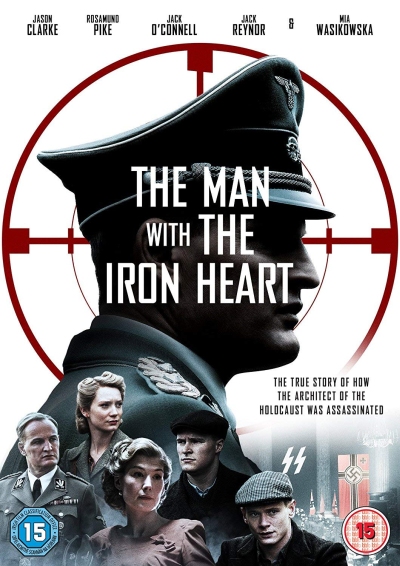| Title: | The Man with the Iron Heart |
| Director: | Cédric Jimenez |
| Cast: | Jason Clarke, Rosamund Pike, Jack O’Connell, Jack Reynor et al. |
| Released: | 2017 |
| Publisher: | Lionsgate |
| Playtime: | 120 minutes |
| Description: | Can you have a historical figure in a story drink tea, when in reality he maybe only drank coffee? It's a remarkable question raised by the French writer Laurent Binet in his 2010 novel "HhhH" (the abbreviation of Himmler's nickname Heydrich). In it, the Frenchman reconstructs the life of top-class Nazi Reinhard Heydrich and also the successful attack on his life on 27 May 1942 in Prague by Czechoslovak agents dropped into occupied territory with parachutes from Great Britain, Jozef Gabèík and Jan Kubið. His book is also a reflection on the freedom that authors take by having people in historical novels do things and say words that have been made up, or in Binet's words: "to play them like a puppet". In 2017, the Franco-Belgian filming of Binet's book by the French director Cédric Jimenez followed. A year earlier, the film "Anthropoid" about the attack on Heydrich was released. Both films were preceded by other films on the same subject. As early as in 1943,"Hammocks Also Die!" and "Hitler's Madman" appeared. In total, the online film database IMDb has 17 titles in which the attack on Heydrich plays a role. The figure of Heydrich and how he came to his end, appears to evoke a certain fascination, which is not incomprehensible. Within the history of the Holocaust, the SS has a leading role and Heydrich is also the only Nazi of stature who died as a result of an assassination, which was also set up from abroad. Although he died in 1942 and did not experience the deadliest phase of the Holocaust, Reinhard Heydrich ended up in the history books as the founder of the Endlösung (Final Solution); the extermination of the European Jews during the Second World War. It was the 'man with the iron heart', as Hitler Heydrich would have called, who founded the Einsatzgruppen which in 1941, caused death and destruction in the Soviet Union, especially among the Jewish population. A year later, it was he who organised the conference in the villa on the Wannsee, where the mass murder in the extermination camps was coordinated between the relevant party and government institutions. In the previous fall, Heydrich was appointed deputy state protector of Bohemia and Moravia, the present-day Czech Republic. The life course of Heydrich is well documented in the film "HhhH", starting with his discharge from the navy and followed by how he came into contact with the Nazi party, thanks to his wife, and was eventually recruited by SS leader Heinrich Himmler to set up an intelligence service within the SS. While the first part of the film talks about Heydrich's Nazi career, the second part is about the assassination and its preparations. Here, attackers Gabèík and Kubið are followed. Perhaps the most exciting part follows after Heydrich died of his injuries in the hospital in Prague. The SS starts a manhunt for the perpetrators, which ends on 18 June in a two-hour firefight in the Saint-Cyril and Saint-Methodius church in Prague, where the two are hiding with the other agents involved in the attack. They held out remarkably long against a supremacy of SS soldiers. In general, the film gives a correct picture of history. Especially for those who are not or hardly familiar with the person Heydrich it is an interesting production. We see how a family father, who makes music with his son in his spare time, turned into one of the greatest Nazi criminals, driven by ambition. Unfortunately, the actor who performs him (Jason Clarke) does not resemble him and also speaks English (like all other actors), which undermines his credibility. Clarke, actually just plays a stereotypical Nazi. The German actor Detlef Bothe from "Antrophoid" was much better cast. The Germans also featured in the Dutch VPRO documentary series "HhhH", a very successful and clever television adaptation of Binet's book. This film stands out against the Dutch production in terms of originality. While the documentary series experiments with different, sometimes experimental narratives forms, the film follows the beaten path. It is all beautifully filmed and there is no lack of suspense, but something essential is missing. Cédric Jimenez's film has little to do with the book, in which the writer chose a non-traditional form of historiography. Instead of limiting himself to historical facts, he also wrote about his own thoughts and feelings during his research into Heydrich and about his fascination for this person and the perpetrators of the attacks. Unfortunately, this important aspect is completely absent from the film. It also shows how the filmmakers manipulate the facts in favour of drama without any reservation. An example of this is how Heydrich, shortly before he takes his last breath in his hospital bed, hands out a bound version of the minutes of the Wannsee conference to Himmler to pass on to Hitler. There is nothing to indicate that this has happened. Dramatization is a freedom that filmmakers can normally afford, but in this example it is far removed from Binet's reflection as to whether a coffee-drinking historical figure should be allowed to drink tea. |
| Rating: |    (Good) (Good) |
Information
- Translated by:
- Fernando Lynch
- Article by:
- Kevin Prenger
- Published on:
- 22-04-2019



